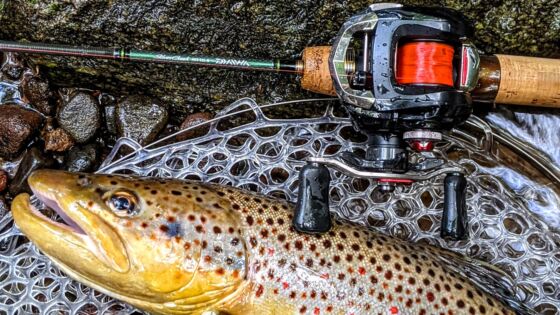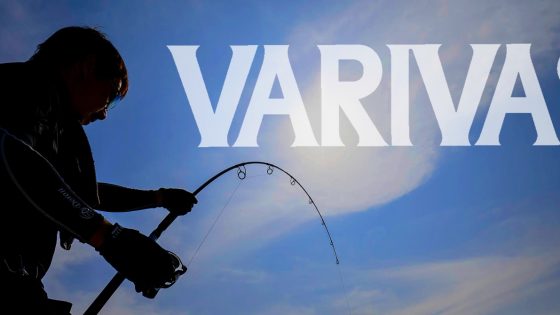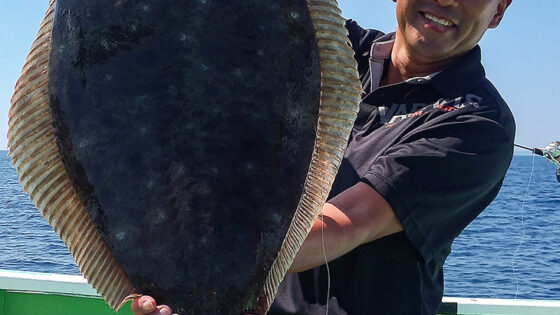Vol. 04 Part 1
 Catch once, never twice.
Catch once, never twice.
Receive maximum satisfaction with minimal exploitation.
Takuya Kozuka is on a river flowing through Saitama prefecture. The target he seeks is a Gibachi that he has not yet caught. It’s a small catfish unique to Japan, designated an endangered species by the Japanese Ministry of the Environment. When Kozuka heard that Gibachi live in this river he stopped by while visiting Tokyo. It’s my first time to fish this river, and my first challenge to fish for Gibachi. Kozuka quietly steps into the river and identifies the points. The moment of delight suddenly came in about 10 minutes. Kozuka pulled up his rod after the first hit after entering the water to find a 20 cm long Gibachi on the hook. “All right!” echoed Kozuka’s shout. Our guide, an older fisherman and member of the local fishery cooperative opened his eyes wide, exclaiming, “He’s someone! To catch such a huge Gibachi on the first try!” Kozuka remarked, “Catching a small, rare fish like the Gibachi is equally as exciting as catching a mysterious fish in the Amazon. It’s also a blessing that we’re able to unknowingly confirm that endangered species inhabit such a small river.”
After taking a photo for the record, Kozuka gently released the Gibachi. With a bit of melancholy he watched it swim off. “I can no longer enjoy the thrill of when I first caught it. From my personal point of view, I basically don’t want to catch endangered species fish again, and I don’t want to continue fishing them as a routine repetition. I don’t aim to increase the size or catch more fish like this because I don’t think that’s the way to interact sustainably with nature. That’s why I won’t be able to get as excited as today for fish like Gibachi. I feel a little empty when I think about how I will not experience this excitement again. I love fish, and I love fishing. If possible, I would like to meet all 28,000 species of fish in the world. What’s more, my unrivaled greed. Common prey is not enough. Therefore, I’m fascinated by the rare fish and unknown mysterious fish. However, even catch and release fishing, no doubt, is an act of damaging fish. So I’m imposing the philosophy–my modis operandi— of ‘Seek maximum satisfaction with minimum exploitation of nature’ on myself.
 The boy ‘Terminator’ of alien fish.
The boy ‘Terminator’ of alien fish.
“I will be back.” The return of my fishing passion.
Kozuka recalls his first fishing experience as a toddler at the age of 1 or 2. It is not the real thing. But rather a handmade toy made by his father, comprised of fish and octopus shapes cut out of corrugated cardboard connected with clips, magnets and thread tied to a stick from the garden.. “I liked the fish, I think, better than fishing.” Kozuka liked aquariums so much that his parents took him to visit aquariums all over Japan. (Photo: 2nd birthday). In his early childhood, Kozuka started actual fishing, joining his father at the nearby Toyama Bay. By the time he entered elementary school fishing for dace in the neighborhood canal and Whiting at sea had become a daily after-school routine for Kozuka.
When he was an older elementary student Kozuka witnessed a memorable scene. One evening on the way home from school he saw an angler casting a lure from the breakwater to catch a grouper, an expensive fish in Japan. “It shocked me that he was using a lure, since I didn’t believe you could catch fish with fake bait. I then found a battered worm lure thrown away by someone and I tried to use it. I caught a Greenling and Rockfish with it and was completely fascinated. From that point on, I was ‘lured’ by lures.”
Kozuka’s attraction to Bass fishing happened rather unexpectedly. When he was in the 6th grade Kozuka was surprised to learn that there was Black Bass in a pond near his grandmother’s house. “Why is there a foreign fish in such a rural pond?” He thought. “If I don’t understand well, I must act on it.” For young Kozuka, Black Bass was a mysterious fish. “I wanted to catch this monster with a lure,” he recalls. “It was an alien fish from other parts of the world that I had not seen before. In my child’s mind, Black Bass was like an alien from outer space.”
Upset because he was unable to catch one on the first day, Kozuka tried again the next day. This was the last day of summer vacation, and his last chance before the start of school, to exterminate this monster. Luck was with him that day. “I still remember it clearly. It’s a great summer memory that had a impact on me as an angler.”
When he entered junior high school Kozuka’s devotion to Black Bass fishing began. Everyday after kendo fencing class Kozuka would ride his bicycle to the pond near his school and go fishing. “I devoured every issue of Black Bass fishing magazine which was released on the 26th of every month.”
My enthusiasm suddenly stopped, however, when I became a high school student. Unless asked, Kozuka never mentioned his fishing hobby. Everyone around him had started playing the guitar, so Kozuka switched out his fishing rod for a guitar, despite how crazy he was about fishing.
It wasn’t until his second year of high school that Kozuka held a fishing rod again for the first time in a long time. “I broke up with the girl I was dating, and I went to the sea to change my mood.” It was the later half of August and the peak season of Pheasant Grouper. “To be honest, I think I just went because I wanted to play the role of ‘a sad and lonely boy by the sea breeze,’” laughs Kozuka. While catching Pheasant Groupers that day, his passion for fishing came back. Kozuka soon returned to the same level of fishing maniac that he’d been in junior high school.
 Romanticizing an adventurous life of catching monster fish.
Romanticizing an adventurous life of catching monster fish.
Preparing and training to live on an uninhabited island.
While studying biology at Tohoku University in Japan, Kozuka awoke to the idea of fishing abroad. Noritaka Takeishi, an adventurist who walked around the world, was his inspiration. After taking the university entrance exam Kozuka went to Akita Prefecture where Takeishi lives. Typically, when fishing abroad, Japanese anglers usually hire local guides. Not Norioka Takeishi. Instead, he bought a horse, ran alone onto the grassland, into the jungle, and caught fish that exist only in far off rivers.
“So cool!” Inspired by Takeishi, Kozuka decided to travel abroad and catch monster fish. After entering university he worked a part-time job as a construction flagger for 4 months, saving about 100,000 yen (about US$930) a month. Then spent one month studying and preparing to pass exams in Japan. Then would go going abroad for one month. This rotating half-here, half-there cycle became Kozuka’s entire student life.
Thailand was the first country he visited. His first overseas trip, too. Kozuka calls himself a worrywart, as he’s a surprisingly cautious person. He even planned for a worst case situation where all his money had been robbed in a remote area far away from the modern convenience of Japan. He tried to prepare and train himself on a desert island in Japan in advance for such a situation. “When I think about it now, It doesn’t make any sense, but I think I wanted to know my physical limitations of being hungry.” He invited his classmates from the university to an uninhabited island on the Oshika Peninsula. After being accused of illegally catching Uni (sea urchin), he was forced to move to a campsite on the inhabited island. (photo: Kozuka is on the far right). Fellow campers donated their extra food to these starving students which were he and his friends. “We inhaled that food,” Kozuka laughs. After that, he carried a 25 kg bag on back and tried to see how many kilometers he could walk a day. He found out that he could walk 55 km a day. Thus if he is within 300 km of the airport at the remote destination, he figured that he could walk back in six days to catch the plane and return to Japan without any money.
He also practiced hitchhiking from Sendai to his friend’s house in Niigata. The delusion that ‘overseas is a dangerous place’ filled in his mind. He methodically came up with all the risks, and prepared for them one by one. “But when I went to Bangkok the capital of Thailand it turned out to be just a big city. I visited Khao Laem on the border with Myanmar and caught a fish called Shadow, but in the end, it wasn’t as dangerous as I’d expected. It turned out to be an easy journey. Six months later, I suddenly jumped to my next fishing trip this time to Papua New Guinea, the world’s unknown region.”
Kozuka suffered an unexpected pitfall, however, catching malaria and collapsing.
To be continued…see Part 2 ‘Unforgettable feeling of cruelty’
The original article was published in Japanese by Morris Company, Ltd., June 27, 2014. True Voice
Vol. 04, Part 1

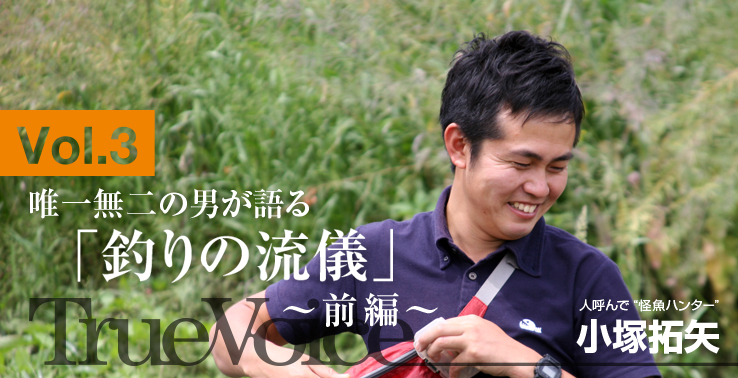
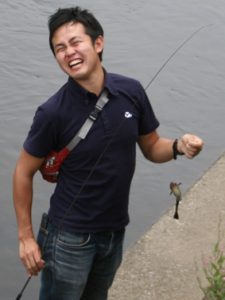 Catch once, never twice.
Catch once, never twice.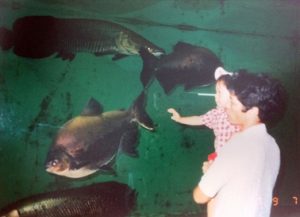 The boy ‘Terminator’ of alien fish.
The boy ‘Terminator’ of alien fish.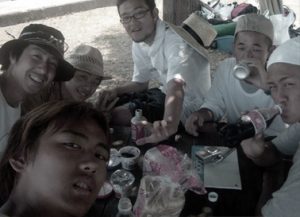 Romanticizing an adventurous life of catching monster fish.
Romanticizing an adventurous life of catching monster fish.